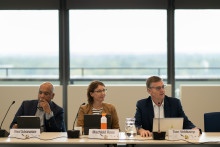From 2026 onwards, the UT aims to write 'black figures' again, after a deficit of over 11 million euros in 2022 and an expected deficit of some 17 million euros this year. In 2024, however, there is still a budgeted negative result and the UT will maintain a 'conservative course' due to all sorts of uncertainties such as the election results and the internationalisation debate.
Negative budgeted result
A concrete amount is not mentioned in the communiqué - the Executive Board did not provide such data when asked. However, the total budget for next calendar year (€513 million) is mentioned. This draft budget takes into account a negative budgeted result of 2 percent on the first money stream - over 60 percent of the total budget. A quick calculation and you arrive at an expected deficit of over €6 million.
In 2025, the deficit should be no more than 1 percent. By 2026, 'income and expenditure must be fully balanced'. After that, the UT must again record structurally positive results, 'to replenish equity to the level required for a financially healthy and resilient organisation'.
To prevent staff costs from rising too high, the recently announced measures - a stop on vacancies and not extending temporary contracts unless strictly necessary - will remain in force in 2024.
Three spearheads
To gain ground on the revenue side, the Executive Board has drawn up three 'spearheads'. These include maintaining student intake at least at the current level and making UT education future-proof. For example, the Executive Board wants to 'evaluate the practical implementation of the Twente Education Model' in order to better align it with the needs of students and teachers. In addition, the EB continues to 'firmly commit' to Lifelong learning.
The UT also wants to improve revenues from the second and third money streams, which are revenues from research grants and contract research for governments, companies and non-profit organisations.
Closed committee meeting
Today, the Executive Board discusses the draft budget with the University Council. This is done in an internal, closed committee meeting. On 13 December, the plenary meeting between the University Council and the Executive Board will take place. Then it will become clear whether the council agrees with the financial plans. Then it is up to the Supervisory Board to give its final approval to the budget. That is scheduled for 21 December.







